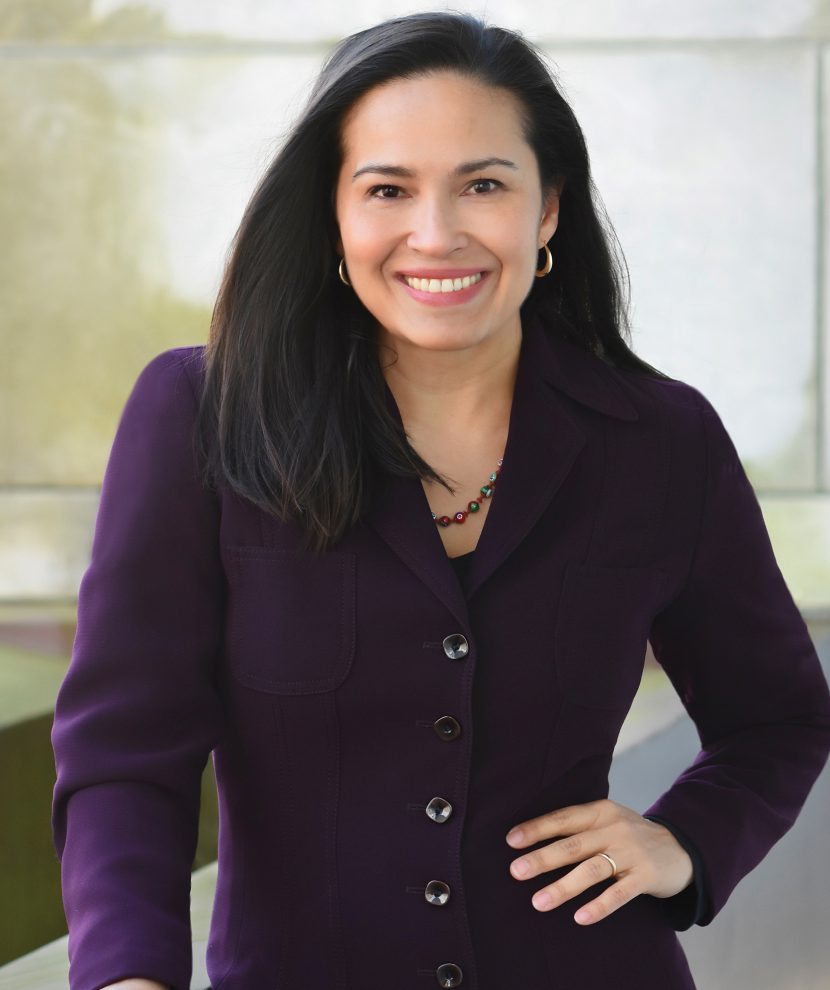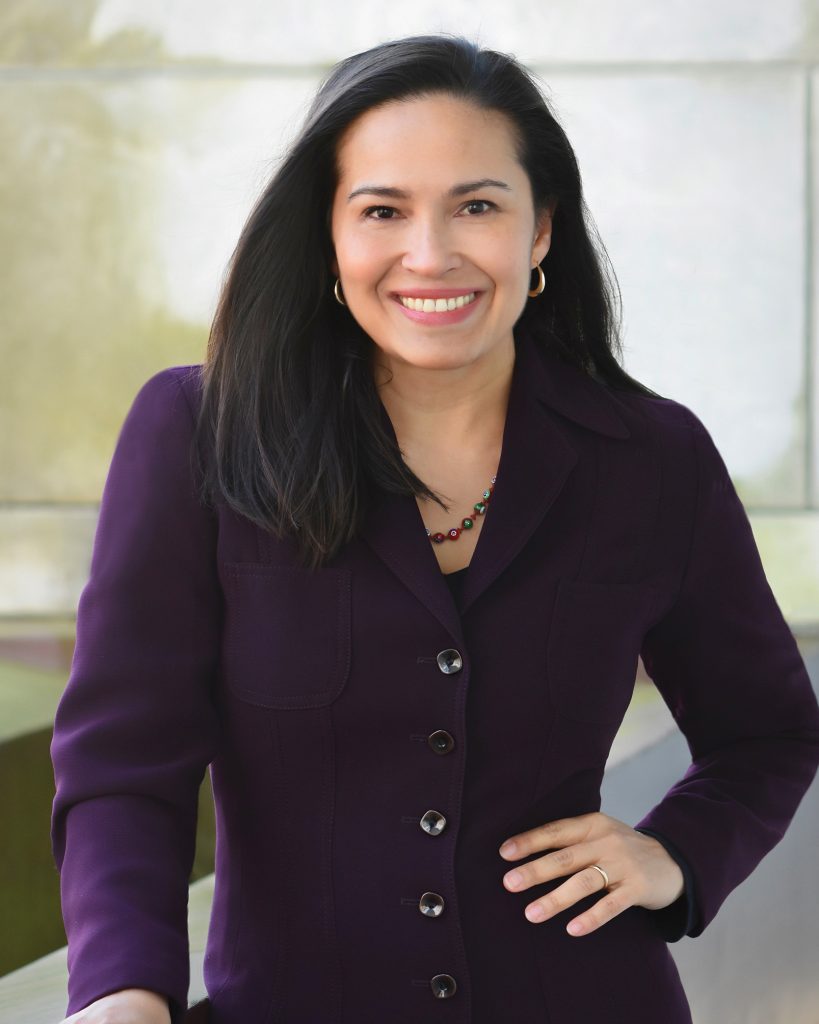Boston College has named Odette Lienau, professor of law and former associate dean for faculty research and intellectual life at Cornell University Law School, the inaugural Marianne D. Short, Esq., Dean at Boston College Law School, effective January 2023.
“One of the things that I think is distinctive about the BC Law mission, which connects to the Jesuit heritage of the school, is the commitment to concentric circles of service and justice: that you are committed to work on behalf of the people who are immediately around you, but also the locality in which you’re based, the country in which you’re based, and the world more generally,” Lienau said. “I feel that is something very valuable, which really speaks to me.”
A distinguished legal and political scholar and internationally renowned expert on sovereign debt issues, with a special focus on developing and transitional countries, Lienau has centered her research and teaching interests on international economic law, debtor-creditor relations, international politics, and political and legal theory. Lienau has served as a consultant and expert for the United Nations, the International Monetary Fund, and the World Bank, and offered Congressional testimony on the international debt architecture before the United States House Financial Services Subcommittee on National Security.
“I really believe it is important for students to understand the degree of global interconnectedness that we face, whether they’re doing private practice work or publicly focused work, and whether they plan to work at an international or a local level, either way. And here, I’m considering the interconnectedness of global health, dependence on supply chains, overlapping regulatory systems, climate change,” she said. “Also, for example, the way in which human rights concerns, economic crises, and failures in government transitions impact the movement of people across borders. BC Law and BC in general were set up in part as a response to the needs of immigrant communities. Keeping that in mind continues to be incredibly important.”
Lienau’s scholarship seeks to understand the broad international market rules that affect expectations about appropriate behavior for businesses, governments, and other actors. “I think my personal journey into law really is through the substance of the law and a sense of the role that law is playing in the world,” Lienau said. “I wanted to be part of that world and the potential change that we, as lawyers, seem capable of making in the world.”
She is the author of Rethinking Sovereign Debt: Politics, Reputation, and Legitimacy in Modern Finance, which won an American Society of International Law Book Award in 2016, and which challenges the conventional wisdom that all states—including those emerging from a major regime change—must repay debt or suffer reputational consequences in a functioning international capital market. Her current research considers different approaches to sovereign debt collection as a lens for understanding distinctions between public and private wealth, and her articles and chapter contributions have appeared in the Harvard International Law Journal, Yale Journal of International Law, Virginia Journal of International Law, Hastings Law Journal, Yale Law Journal Forum, and Oxford University Press, among other publications.
Lienau has focused her career on the legal academy because, she said, “it allowed me to connect my interest in law, legal doctrine, legal practice with these broader interdisciplinary questions that I was interested in.” Yet she believes she could have found happiness and fulfillment in a career that might have taken her into the public or private sector as well. “What I’m hoping to encourage in students is an understanding that you never quite know where your legal career and your life is going to take you—that there are ways in which all of these areas could be very meaningful and productive, and so stay open to them,” she said. “I feel incredibly grateful for the trajectory that I’ve had, but I think there could have been other trajectories as well. And I’m excited to help students and maybe alums find their own trajectories and to be open to them.”
“It is an incredibly important time to educate lawyers who are dedicated to developing their talents to the fullest and finding meaning in their work, and who are committed to the equal dignity of all and to serving others in their lives.”
Incoming Dean Odette Lienau
She is a life member of the Council on Foreign Relations and a member of the American Society of International Law, American Political Science Association, and Law & Society Association.
Looking ahead, Lienau said, “I think there are important new developments in legal areas and legal education, some of which have been accelerated by the pandemic and the general discord and distress of the last several years.” These include issues surrounding diversity, equity, inclusion and access, and matters of law and technology.
In announcing the appointment last May, Provost and Dean of Faculties David Quigley praised Lienau as a person with the breadth of knowledge, global perspective, and vision to lead Boston College Law School into the future.
“The search committee was pleased to see that our deanship generated strong interest from an impressive cohort of legal educators from leading law schools across the country,” said Quigley. “Odette Lienau stood out as an accomplished scholar and educator who offered up a compelling vision for the future of Boston College Law School. I am excited to welcome her to campus next January and to work together to educate the kinds of lawyers our society needs.”
BC Law School Founders Professor Mary Sarah Bilder, who served on the search committee, called Lienau “an extraordinary scholar, inspirational leader, and imaginative problem-solver with an abiding faith that global and local communities can be improved through thoughtful and respectful intellectual engagement. I am thrilled to be able to be at BC Law as this next amazing chapter unfolds,” Bilder said.
“Odette Lienau is an absolutely outstanding choice for our next dean,” added BC Law professor and search committee member Vlad Perju, who cited her scholarly reputation, administrative experience, and vision for the school. “With erudition and skill, she has shown how law can be used in the area of international finance and beyond as an instrument of emancipation and justice rather than a tool for oppression and domination. We simply could not have hoped for a better dean.”
Lienau welcomes the opportunity. “These last several years have seen such upheaval for individuals, the nation, and the world—in struggling with racial justice, the meaning of democratic rule, and the management of a global pandemic and its fallout,” she said.
“It is an incredibly important time to educate lawyers who are dedicated to developing their talents to the fullest and finding meaning in their work, and who are committed to the equal dignity of all and to serving others in their lives. I so look forward to working with everyone at the Law School and at the University to further strengthen this mission and to amplify its impact in the world.”
A magna cum laude graduate of Harvard University, where she received a BA in social studies and served as president of the Harvard Society of International Students, Lienau graduated cum laude from New York University School of Law, winning the Jerome Lipper Graduation Prize for outstanding work in international law and the John Bruce Moore Award for excellence in law and philosophy. She then completed a PhD in government/political science at Harvard, where she earned the Charles Sumner Prize for best dissertation on international issues.
Upon completion of her studies, Lienau served as an associate at the New York law firm Shearman & Sterling LLP, working in its Financial Restructuring & Insolvency Group. She joined the faculty at Cornell Law School in 2010 and taught courses in International Economic Law; Bankruptcy and Debtor-Creditor Law; International Law & International Relations; Markets, Democracy, and the Rule of Law; and Sovereign Debt. She also served on the law school’s faculty appointments and building and design committees and chaired the upper-level curriculum and transition committee in 2020 to help facilitate the shift to online and hybrid pedagogy.
A dedicated and highly respected teacher who is credited with bringing an interdisciplinary and historically informed perspective to the classroom, she has also been a faculty member in Cornell’s Graduate School of Arts and Sciences, serving as a committee member and external reviewer for doctoral theses in the fields of government and peace studies.
Speaking of the core priorities of a legal education, Lienau said, “You really want to be educating lawyers with excellent analytical and practice skills, but also lawyers who understand the importance of pursuing work that’s personally meaningful and connected to some broader community.” She continued: “Something I tell my students when I’m teaching is that I want them to be ready for their first day on the job as an attorney, but I’m also trying to prepare them for their thirtieth year as an attorney—where a client is going to value that broader perspective, so they can really be a counselor in the broadest sense of the word.”
“With erudition and skill, she has shown how law can be used in the area of international finance and beyond as an instrument of emancipation and justice rather than a tool for oppression and domination. We simply could not have hoped for a better dean.”
Vlad Perju, BC Law professor and search committee member
In addition, she held appointments as the Martin R. Flug Visiting Professor of Law at Yale Law School and the Nomura Visiting Professor of International Financial Systems at Harvard Law School.
As Cornell’s inaugural associate dean for faculty research and intellectual life, Lienau worked collaboratively with faculty, administrators, and students to promote community collegiality—particularly by recognizing faculty achievement, supporting diversity, equity, and inclusion, addressing Covid-19 challenges, and responding to a range of educational issues from evolving ranking methodologies to global exchanges. She also facilitated faculty- and staff-wide presentations regarding national conversations on racial justice, including on histories of policing and competing constitutional narratives.
Born and raised in Jakarta, Indonesia—the birthplace of her mother—with visits to her father’s hometown of Sheboygan, Wisconsin, Lienau noted, “I grew up overseas, but I am of a mixed background. I was based in Indonesia, but I’d spend time with my American family primarily in the Midwest. And so, I’m very aware of the different perspectives that well-meaning people can have on the same issue, whether it is some element of a UN decision on military intervention or a perspective on the US Constitution and whether it actually is democratic or not,” Lienau said.
“Perhaps because of that global background, I’m attuned to see the interconnectedness of law, the interconnectedness of the political, economic, and social systems in which law is embedded and which law helps to shape,” Lienau said. She is conversant in Indonesian and French. Her interests include travel, reading, dance, and hiking.
Lienau and her husband, law professor Aziz Rana—who will be leaving Cornell with her to join the BC Law faculty—have roots in Boston and look forward to reintroducing their two children, ages five and nine, to the area.
“Aziz and I are delighted to return to Greater Boston, where we spent many years as students and where we have family ties,” said Lienau. “We plan to revisit some old favorite spots and, as a family, we are excited to discover more of the vibrant neighborhoods and beautiful natural areas in this dynamic region.”
The Marianne D. Short, Esq., Law School Deanship was established in 2021 through a $10 million gift from Short, a Boston College trustee and the executive vice president, chief legal officer, and member of the Office of the Chief Executive at UnitedHealth Group. A 1973 graduate of the Newton College of the Sacred Heart and a 1976 graduate of BC Law, Short made the gift in recognition of the “guiding force” that Boston College Law School has been throughout her life and illustrious forty-five-year legal career.
Provost Quigley said that Professor of Law and Dr. Thomas F. Carney Distinguished Scholar Diane Ring will remain through the fall semester as interim dean of the Law School, where she has provided steady leadership since her appointment in June 2021. “Diane Ring has been a wonderful partner this academic year and I am grateful that she will serve one additional semester as interim dean,” said Quigley. “Her commitment to the Law School community is extraordinary.”
BC Law writer Jeri Zeder and Jack Dunn of the Office of University Communications contributed to this report.




